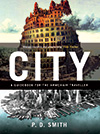The Tragic Sense of Life
23 July 2008 | Darwin, Haeckel, Reviewing, RJ Richards, TLS | 2 comments
The Times Literary Supplement has just published my review of The Tragic Sense of Life: Ernst Haeckel and the Struggle over Evolutionary Thought, by Robert J. Richards. It is an immensely impressive work of biography and intellectual history, and a fitting testament to a complex and contradictory character, a man Richards describes as a “polymorphic scientist-artist-adventurer”.
 In his own day, Haeckel was a hugely controversial figure and a hate-figure for many Christians because of his relentless harrying of their beliefs. Historians have savaged Haeckel's reputation and Richards accepts that he was “a man of contradictions”, a driven character and a divisive figure.
In his own day, Haeckel was a hugely controversial figure and a hate-figure for many Christians because of his relentless harrying of their beliefs. Historians have savaged Haeckel's reputation and Richards accepts that he was “a man of contradictions”, a driven character and a divisive figure.
But Richards succeeds brilliantly in re-establishing Haeckel as a significant scientist and a major player in the history of evolutionary thought. Richards is particularly good at tracing the origins of Haeckel’s “Romantic evolutionism”. As the author of an earlier and equally impressive study of how Romanticism shaped biological thought in the first half of nineteenth century, The Romantic Conception of Life (2002), Richards is ideally qualified for this task.
Before World War I, more people learned about evolutionary theory from Haeckel than any other source, including Darwin’s own writings. In The Descent of Man, Darwin himself praised one of Haeckel’s books, saying “if this work had appeared before my essay had been written, I should probably never have completed it.” Richards portrays Haeckel as an unjustly forgotten genius, a figure of “startling creativity, tireless industry, and deep artistic talent”. Richards argues that Haeckel was Darwin’s “authentic intellectual heir”.
You can read my review in this week's TLS (25 July), or read a longer version here.


Paul Halpern | 27 July 2008
Very interesting review about an important scientist whose career was almost lost to history. Pity about the mistake with the three identical embryo illustrations; it is a shame when a simple mistake undermines someone's basic arguments. We see that happening often in politics; many in the public tend to focus on the errors candidates make rather than on their ideas and achievements.
PD Smith | 28 July 2008
Thanks Paul. Yes, one small mistake can have big consequences...